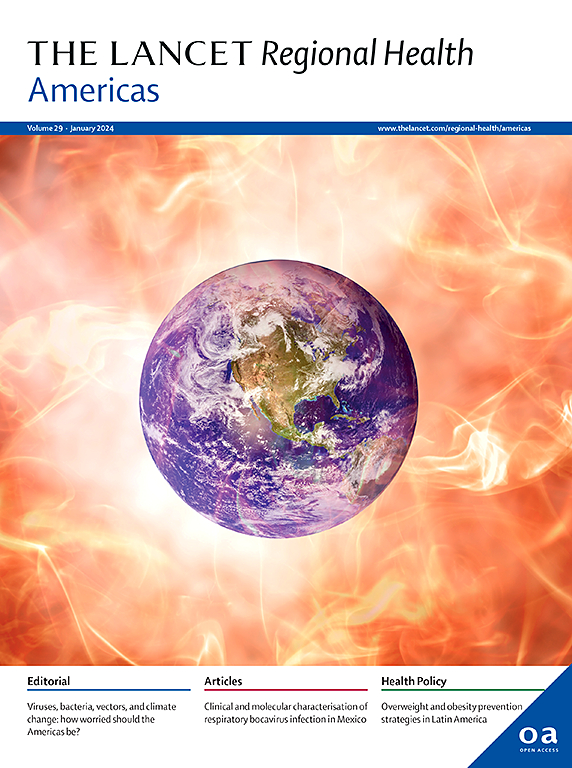Clinical and economic impact of the availability of innovative therapies for advanced lung cancer in men in Latin America: a population-based secondary data study
IF 7
Q1 HEALTH CARE SCIENCES & SERVICES
引用次数: 0
Abstract
Background
Over the last decade, the development of innovative cancer treatments has accelerated and has been associated with improved mortality trends; however, local regulatory approval times are extensive. This study estimated the clinical and economic impact of delays in the approval of innovative therapies for the treatment of advanced lung cancer in men in five Latin American countries.
Methods
Using public data, we estimated the relationship between available innovative therapies (AIT) and age-specific mortality rate (ASMR) for Argentina, Brazil, Chile, Colombia, and Mexico through a regression model. Based on the difference between the number of FDA-approved therapies and the number approved by each local agency, we calculated the avoidable deaths (ADs) if innovation had been available. We estimated the Years of Life Lost (YLLs) using the life expectancy, the median age of death, and the ADs. Productivity loss (PL) was calculated using each country’s retirement age and yearly Gross Domestic Product per capita (GDPc) in 2022 constant USD.
Findings
Total ADs, YLLs, and PL were 8694, 114,477, and USD 439,179,876, respectively. Argentina had the highest impact of AIT on ASMR. Brazil’s results showed a high clinical and economic impact, primarily due to its large population. Chile’s high GDPc led to high PL. Colombia and Mexico showed a high clinical impact, suggesting a benefit of early approval. Differences in availability and approval times have increased with the number of FDA-approved therapies, yet local time gaps have recently increased.
Interpretation
Our study shows the substantial clinical and economic impact of delays in approving innovative therapies, underscoring the potential of improving regulatory processes to increase the availability of lung cancer treatments. Accelerating the introduction of innovative therapies for advanced lung cancer in Latin America represents a significant opportunity to enhance survival rates, instilling hope and optimism while also avoiding substantial PL.
Funding
This study was conducted as a research partnership between Roche and CTIC. No funding was received. Authors participated in the study design, data collection, data analysis, interpretation, and writing of the report.
拉丁美洲男性晚期肺癌创新疗法可用性的临床和经济影响:一项基于人群的二次数据研究
背景:在过去的十年中,创新的癌症治疗方法的发展已经加速,并与死亡率趋势的改善有关;然而,当地监管机构的审批时间很长。这项研究估计了五个拉丁美洲国家延迟批准用于治疗晚期男性肺癌的创新疗法的临床和经济影响。方法利用公开数据,通过回归模型估计阿根廷、巴西、智利、哥伦比亚和墨西哥可用创新疗法(AIT)与年龄特异性死亡率(ASMR)之间的关系。根据fda批准的治疗方法数量与每个地方机构批准的治疗方法数量之间的差异,我们计算了如果有创新,可避免的死亡(ADs)。我们使用预期寿命、死亡年龄中位数和ad来估计生命损失年数(YLLs)。生产力损失(PL)是使用每个国家的退休年龄和2022年不变美元的年度人均国内生产总值(GDPc)来计算的。总ADs为8694,总yl为114,477,总PL为439,179,876美元。阿根廷的AIT对ASMR的影响最大。巴西的结果显示出很高的临床和经济影响,主要是由于其人口众多。智利的高gdp导致了高PL,哥伦比亚和墨西哥表现出了高临床影响,表明早期批准的好处。可获得性和批准时间的差异随着fda批准的疗法数量的增加而增加,但当地时间差距最近也在增加。我们的研究显示了延迟批准创新疗法的重大临床和经济影响,强调了改善监管程序以增加肺癌治疗可用性的潜力。加速拉丁美洲晚期肺癌创新疗法的引入是提高生存率的重要机会,为患者带来希望和乐观,同时也避免了大量的损失。本研究由罗氏和CTIC合作开展。没有收到任何资金。作者参与了研究设计、数据收集、数据分析、解释和报告撰写。
本文章由计算机程序翻译,如有差异,请以英文原文为准。
求助全文
约1分钟内获得全文
求助全文
来源期刊

Lancet Regional Health-Americas
Multiple-
CiteScore
8.00
自引率
0.00%
发文量
0
期刊介绍:
The Lancet Regional Health – Americas, an open-access journal, contributes to The Lancet's global initiative by focusing on health-care quality and access in the Americas. It aims to advance clinical practice and health policy in the region, promoting better health outcomes. The journal publishes high-quality original research advocating change or shedding light on clinical practice and health policy. It welcomes submissions on various regional health topics, including infectious diseases, non-communicable diseases, child and adolescent health, maternal and reproductive health, emergency care, health policy, and health equity.
 求助内容:
求助内容: 应助结果提醒方式:
应助结果提醒方式:


